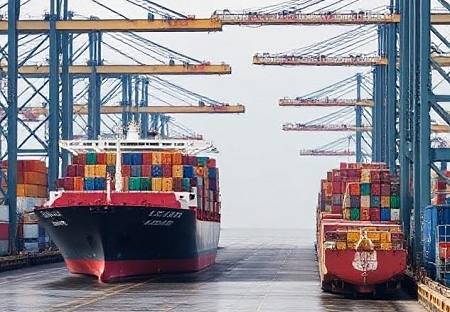The global cargo shipping market is a cornerstone of international trade, facilitating the movement of goods across continents and oceans. As the backbone of globalization, this industry has witnessed significant growth over the past few decades, driven by increasing trade volumes, technological advancements, and the expansion of e-commerce. However, the sector is not without its challenges, including fluctuating fuel prices, environmental regulations, and geopolitical tensions.
Market Overview
The cargo shipping market encompasses a wide range of services, including container shipping, bulk shipping, and tanker shipping. Container shipping, which involves the transportation of goods in standardized containers, is the most dominant segment, accounting for a significant share of the market. Bulk shipping, on the other hand, deals with the transportation of unpackaged goods such as coal, grain, and ore, while tanker shipping focuses on the movement of liquid cargo, primarily oil and gas.
Cargo Shipping Market Size was valued at USD 15.00 billion in 2023. The Cargo Shipping industry is projected to grow from USD 15.765 Billion in 2024 to USD 23.4 billion by 2032, exhibiting a compound annual growth rate (CAGR) of 5.06% during the forecast period (2024 – 2032).
List of the Key Companies in the Cargo Shipping market include
- P Moller – Maersk (Denmark)
- Panalpina World Transport (Holding) Ltd. (Switzerland)
- CMA CGM Group (France)
- MSC Mediterranean Shipping Company S.A. (Switzerland)
- DB Schenker (Germany)
Key Trends in the Cargo Shipping Market
- Digitalization and Automation: The cargo shipping industry is undergoing a digital transformation, with companies increasingly adopting technologies such as blockchain, artificial intelligence (AI), and the Internet of Things (IoT) to enhance efficiency and transparency. Automation is also playing a crucial role, with the development of autonomous ships and automated port operations reducing human error and operational costs.
- Sustainability and Environmental Regulations: Environmental concerns are driving significant changes in the industry. The International Maritime Organization (IMO) has implemented stricter regulations on sulfur emissions, leading to the adoption of cleaner fuels and the development of eco-friendly vessels. Companies are also investing in alternative energy sources, such as liquefied natural gas (LNG) and hydrogen, to reduce their carbon footprint.
- E-commerce Boom: The rapid growth of e-commerce has had a profound impact on the cargo shipping market. The demand for faster and more reliable shipping services has increased, prompting companies to expand their fleets and optimize their supply chains. The rise of cross-border e-commerce has also led to the development of new shipping routes and services.
- Geopolitical Tensions and Trade Wars: Geopolitical tensions and trade wars have created uncertainties in the global trade landscape. Tariffs and trade restrictions have disrupted supply chains and affected shipping volumes. Companies are navigating these challenges by diversifying their trade routes and exploring new markets.
Get Report Sample Copy with TOC: https://www.marketresearchfuture.com/sample_request/3165
Challenges Facing the Cargo Shipping Market
- Fluctuating Fuel Prices: Fuel costs account for a significant portion of operating expenses in the cargo shipping industry. The volatility of oil prices poses a major challenge, as it directly impacts profitability. Companies are mitigating this risk by investing in fuel-efficient vessels and exploring alternative energy sources.
- Port Congestion and Infrastructure Limitations: Port congestion remains a persistent issue, particularly in major trade hubs. Limited infrastructure and inadequate port facilities can lead to delays and increased costs. Governments and private sector players are investing in port expansion and modernization projects to address these challenges.
- Labor Shortages and Workforce Challenges: The cargo shipping industry faces a shortage of skilled labor, particularly in specialized roles such as ship officers and engineers. Additionally, the COVID-19 pandemic has exacerbated workforce challenges, with crew members facing extended periods at sea and difficulties in repatriation.
- Regulatory Compliance: Compliance with international regulations, particularly those related to environmental protection and safety, is a complex and costly endeavor. Companies must stay abreast of evolving regulations and invest in compliance measures to avoid penalties and reputational damage.
Recent Company News
Maersk: A.P. Moller-Maersk, one of the world’s largest container shipping companies, has been at the forefront of sustainability initiatives. In recent news, Maersk announced the launch of its first carbon-neutral vessel, powered by methanol, in 2023. The company has also invested in digitalization, with the development of its TradeLens blockchain platform, which aims to enhance supply chain transparency and efficiency.
MSC Mediterranean Shipping Company: MSC has been expanding its fleet and market share, recently overtaking Maersk as the world’s largest container shipping company by capacity. In 2023, MSC announced the acquisition of several new vessels, including eco-friendly ships with advanced emission-reduction technologies. The company is also investing in digital solutions to improve customer experience and operational efficiency.
COSCO Shipping: China’s COSCO Shipping has been actively pursuing international expansion and diversification. In recent developments, COSCO announced a strategic partnership with a major European port to enhance its presence in the region. The company is also investing in smart shipping technologies, including AI-powered predictive maintenance systems, to optimize fleet performance.
Buy Now: https://www.marketresearchfuture.com/checkout?currency=one_user-USD&report_id=3165
Related Report
About Market Research Future
At Market Research Future (MRFR), we enable our customers to unravel the complexity of various industries through our Cooked Research Report (CRR), Half-Cooked Research Reports (HCRR), Raw Research Reports (3R), Continuous-Feed Research (CFR), and Market Research Consulting Services. The MRFR team have a supreme objective to provide the optimum quality market research and intelligence services for our clients. Our market research studies by Components, Application, Logistics and market players for global, regional, and country level market segments enable our clients to see more, know more, and do more, which help to answer all their most important questions.
Contact us:
Market Research Future (part of Wantstats Research and Media Private Limited),
99 Hudson Street,
5Th Floor, New York,
New York 10013
United States of America +1 628 258 0071
Email: sales@marketresearchfuture.com
Media Contact
Company Name: Market Research Future
Contact Person: Media Relations
Email: Send Email
Country: United States
Website: https://www.marketresearchfuture.com

